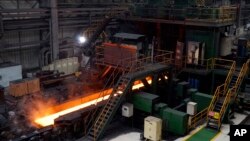Brazilian mining company Vale SA sees declining steel demand in China, the world's largest producer, but the situation is not as dire as some indicators suggest, the company’s vice president of iron ore solutions told Reuters.
Vale is "cautiously optimistic" about the largest global consumer of iron ore, as China's economy has proved resilient, despite uncertainties surrounding possible stimulus measures to achieve growth targets, the Vale executive, Marcello Spinelli, said.
"We can see that there is demand [for steel]. It's declining, but not to the extent that some isolated indicators show to some analysts," Spinelli said. "When you reconcile it with the property numbers [in the construction sector], there is this divergence."
Vale is heavily dependent on sales to China, even as it works to diversify with its base metals unit. Last year, China bought 190 million metric tons (290 million tons) of iron ore and pellets from Vale, representing around 63% of total sales in those segments, according to company data.
Spinelli acknowledged significant distrust among analysts about China's building sector, following liquidity problems for some real estate developers. However, he said many analysts overlook that nondeveloper entities are actively constructing homes at elevated levels, partially offsetting the decline.
He also said low iron ore and steel inventories offer support for the market.
Iron ore inventories at China's ports are at their lowest levels in almost three years, around 118 million metric tons (130 million tons), according to data from consultancy SteelHome. Prices are still holding above $110 per metric ton, but far from this year's peak near $130 and last year's high of $150.
"There's a lot of volatility because nobody knows what the central government is going to decide [about stimulus]. We have to wait a bit," Spinelli said.
"We're cautious optimists, that's what we are. There is a stabilization of the economy at a very high level, and with some adjustment, yes, [growth] will slow moderately over the next five, 10 years, but in a way that is already foreseen," he said.





